The extradition bill is ‘dead’ but political turmoil is not over yet. Since early June, a series of large-scale demonstrations took place in Hong Kong in protest of proposed legislation that would allow extradition of criminal suspects to certain jurisdictions, including mainland China. The proposed bill was triggered by the case of a Hong Kong man who allegedly murdered his girlfriend in Taiwan but could not be sent back for trial in absence of such a legal framework. The proposed bill met with strong opposition from the public on concerns that it would potentially remove the legal ‘firewall’ between Hong Kong and mainland China, and, by extension, lead to erosion of the rule of law in Hong Kong. Facing strong
Topics:
Dong Chen considers the following as important: 5) Global Macro, China, Featured, Hong Kong, Macroview, newsletter
This could be interesting, too:
Nachrichten Ticker - www.finanzen.ch writes Die Performance der Kryptowährungen in KW 9: Das hat sich bei Bitcoin, Ether & Co. getan
Nachrichten Ticker - www.finanzen.ch writes Wer verbirgt sich hinter der Ethereum-Technologie?
Martin Hartmann writes Eine Analyse nach den Lehren von Milton Friedman
Marc Chandler writes March 2025 Monthly
|
The extradition bill is ‘dead’ but political turmoil is not over yet. Since early June, a series of large-scale demonstrations took place in Hong Kong in protest of proposed legislation that would allow extradition of criminal suspects to certain jurisdictions, including mainland China. The proposed bill was triggered by the case of a Hong Kong man who allegedly murdered his girlfriend in Taiwan but could not be sent back for trial in absence of such a legal framework. The proposed bill met with strong opposition from the public on concerns that it would potentially remove the legal ‘firewall’ between Hong Kong and mainland China, and, by extension, lead to erosion of the rule of law in Hong Kong. Facing strong opposition, the Hong Kong government made a few amendments to the bill, such as the exclusion of extradition for political reasons, but they failed to garner much support. On 9 June, hundreds of thousands of people took to the street in an attempt to stop a debate in Hong Kong’s legislature on the bill. The protest escalated in the following days and turned violent on 12 June. The police used pepper spray, tear gas and rubber bullets to dispel demonstrators. |
Gini Coefficient of Selected Countries / Regions Source: perspectives.pictet.com - Click to enlarge |
Following the burst of violence, Carrie Lam, the Hong Kong Chief Executive announced that she would halt the legislation process and apologised to the public for her handling of the situation. This move, however, failed to quell the opponents to the bill, who demanded its complete withdrawal and the resignation of Carrie Lam.
On 1 July, following another large-scale demonstration, violence escalated with a small group of protestors breaking in to Hong Kong’s Legislative Council, ransacking and vandalising the chamber before being dispelled by police force.
On 9 July, Carrie Lam announced that the extradition bill “is dead” but stayed short of announcing a formal withdrawal of the bill from the legislature’s agenda.
At the time of writing, events are still unfolding and one cannot exclude the possibility of further escalation. So far the direct impact of the protests on the economy remains minimal, barring temporary traffic interruptions in small areas of the city and some disruptions to government operations and retail businesses. However, the long-term risks could be severe if social tensions remain elevated.
Tags: China,Featured,Hong Kong,Macroview,newsletter
